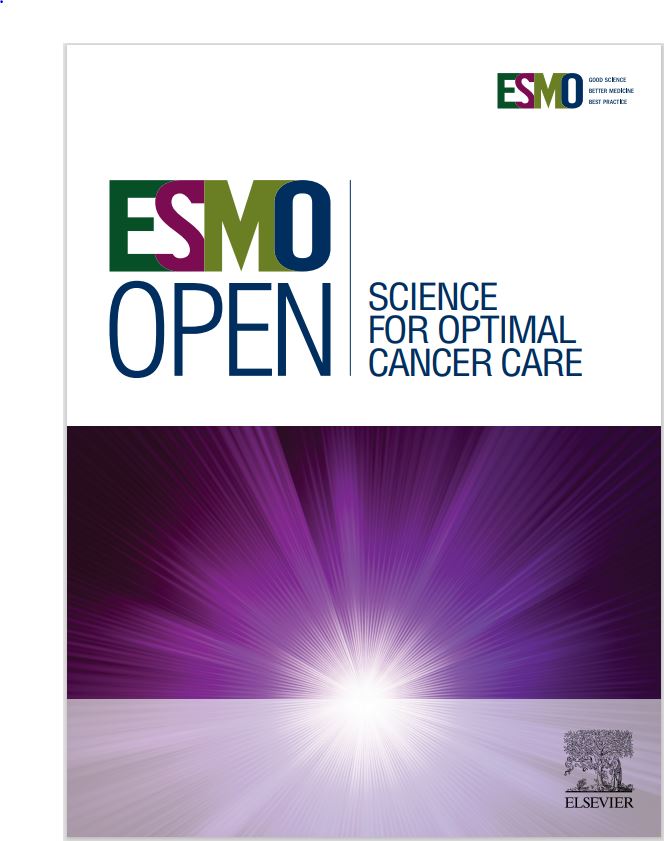cldn18.2阳性胃癌患者含唑贝昔单抗化疗期间早发性胃炎的特征
IF 8.3
2区 医学
Q1 ONCOLOGY
引用次数: 0
摘要
背景:Zolbetuximab是一种靶向CLDN18.2 (CLDN18.2)的单克隆抗体,加化疗已经成为CLDN18.2阳性晚期胃癌的标准治疗方法,并且经常与早发性胃肠道(GI)毒性相关。虽然在临床前研究中观察到唑苯妥昔单抗引起的胃炎,但在患者中尚未报道。患者和方法:我们回顾性分析了人表皮生长因子受体2 (HER2)阴性、cldn18.2阳性、晚期胃癌或胃食管结癌患者在一线佐仑妥昔单抗化疗期间接受内窥镜检查的患者。既往行全胃切除术的患者排除在外。我们评估了胃炎与胃肠道毒性和血清白蛋白水平等临床结果之间的关系。结果:在58例符合条件的患者中,52例(89.7%)在治疗开始后7.8周出现胃炎。内镜下的特征性表现包括粘膜红斑(100%)、白色渗出物(63.4%)、水肿(28.8%)、糜烂或溃疡(26.9%)。胃炎以弥漫性分布为主(76.9%)而非散在性分布(23.1%),常累及胃多区(90.4%)。与没有胃炎的患者相比,弥漫性胃炎患者的任何级别厌食症发生率都明显更高(97.5%比50.0%,P = 0.005),血清白蛋白下降更严重[中位下降-1.2 g/dl,四分位数范围(IQR) -1.525至-0.9 g/dl,四分位数范围(IQR) -0.7 g/dl, IQR -0.8至-0.6 g/dl;P = 0.012]。无患者因胃炎停止治疗。32名患者在持续治疗期间接受了随访内镜检查,其中25名患者得到改善,没有病例在18周后出现未解决的胃炎。结论:早发性一过性胃炎经常发生在含唑苯妥昔单抗治疗后,并与厌食症和低白蛋白血症显著相关。更深入地了解胃炎潜在的独特胃肠道毒性可能为有效的治疗提供见解。本文章由计算机程序翻译,如有差异,请以英文原文为准。
Characterization of early-onset gastritis during zolbetuximab-containing chemotherapy in CLDN18.2-positive gastric cancer
Background
Zolbetuximab, a monoclonal antibody targeting claudin 18.2 (CLDN18.2), plus chemotherapy has become a standard treatment for CLDN18.2-positive advanced gastric cancer and is frequently associated with early-onset gastrointestinal (GI) toxicities. While zolbetuximab-induced gastritis has been observed in preclinical studies, it has not been previously reported in patients.
Patients and methods
We retrospectively analyzed patients with human epidermal growth factor receptor 2 (HER2)-negative, CLDN18.2-positive, advanced gastric or gastroesophageal junction cancer who underwent endoscopy during first-line zolbetuximab-containing chemotherapy. Patients who had undergone prior total gastrectomy were excluded. We evaluated associations between gastritis and clinical outcomes including GI toxicities and serum albumin level.
Results
Among 58 eligible patients, gastritis was observed in 52 (89.7%) at a median of 7.8 weeks after treatment initiation. Characteristic endoscopic findings included mucosal erythema (100%), white exudate (63.4%), edema (28.8%), and erosions or ulcerations (26.9%). The distribution of gastritis was predominantly diffuse (76.9%) rather than scattered (23.1%), commonly involving multiple gastric regions (90.4%). Patients with diffuse gastritis experienced significantly higher rates of any-grade anorexia compared with those without gastritis (97.5% versus 50.0%, P = 0.005) and more profound serum albumin decline [median decrease –1.2 g/dl, interquartile range (IQR) –1.525 to –0.9 g/dl versus –0.7 g/dl, IQR –0.8 to –0.6 g/dl; P = 0.012]. No patients discontinued treatment due to gastritis. Among 32 patients who underwent follow-up endoscopy during ongoing treatment, improvement was confirmed in 25 patients, and no cases exhibited unresolved gastritis beyond 18 weeks.
Conclusions
Early-onset transient gastritis frequently occurred following zolbetuximab-containing therapy and was significantly associated with anorexia and hypoalbuminemia. A deeper understanding of gastritis underlying unique GI toxicities may provide insight into effective management.
求助全文
通过发布文献求助,成功后即可免费获取论文全文。
去求助
来源期刊

ESMO Open
Medicine-Oncology
CiteScore
11.70
自引率
2.70%
发文量
255
审稿时长
10 weeks
期刊介绍:
ESMO Open is the online-only, open access journal of the European Society for Medical Oncology (ESMO). It is a peer-reviewed publication dedicated to sharing high-quality medical research and educational materials from various fields of oncology. The journal specifically focuses on showcasing innovative clinical and translational cancer research.
ESMO Open aims to publish a wide range of research articles covering all aspects of oncology, including experimental studies, translational research, diagnostic advancements, and therapeutic approaches. The content of the journal includes original research articles, insightful reviews, thought-provoking editorials, and correspondence. Moreover, the journal warmly welcomes the submission of phase I trials and meta-analyses. It also showcases reviews from significant ESMO conferences and meetings, as well as publishes important position statements on behalf of ESMO.
Overall, ESMO Open offers a platform for scientists, clinicians, and researchers in the field of oncology to share their valuable insights and contribute to advancing the understanding and treatment of cancer. The journal serves as a source of up-to-date information and fosters collaboration within the oncology community.
 求助内容:
求助内容: 应助结果提醒方式:
应助结果提醒方式:


